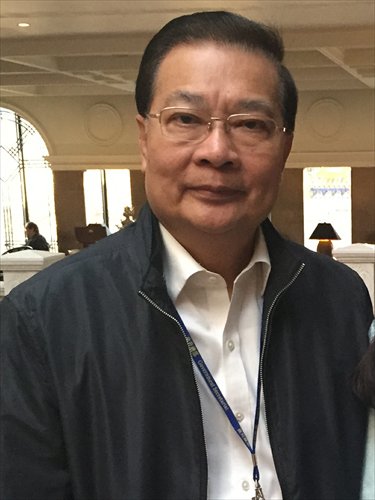
Tam Yiu-chung Photo: Sun Xiaobo/GT
Editor's Note:
In recent years, Hong Kong has seen unrest that has involved mass participation of young people and alongside, its relationship with the Chinese mainland has soured. What should Hong Kong do to enhance the younger generation's perceptions of the mainland? Is Hong Kong losing its advantages? As China pushes forward the 13th Five-Year Plan, how will Hong Kong benefit from it? During the just-concluded two sessions, Global Times (GT) reporters Sun Xiaobo and Fan Lingzhi talked over these issues with Tam Yiu-chung (Tam), former chairman of the Democratic Alliance for the Betterment and Progress of Hong Kong and a member of the 12th National Committee of the Chinese People's Political Consultative Conference.
GT: What do you think are the biggest obstacles for Article 23 of the Basic Law, which has not been enacted after many years' efforts?
Tam: The deficiencies in our work have enabled the opposition to mislead voters into thinking that with Article 23, Hong Kong will lose its freedom and human rights and the opposition is putting a very negative label on the article. People in Hong Kong therefore object to the Article 23 legislation. The Hong Kong Special Autonomous Region (SAR) has a responsibility to draw up the law and this must be done. But good timing needs to be carefully considered to deny any chance for the opposition to attack the legislation. Hong Kong will see its Legislative Council (LegCo) elections in September, chief executive election in March 2017 and a new SAR government taking office in July next year. I think the Article 23 legislation may be enacted after the new SAR government is sworn in or in 2018.
GT: What do you think of the future of the pro-establishment camp in the Legislative Council? Are you pessimistic?
Tam: The procedures of the LegCo were established when Hong Kong was under British rule. They are not very strict since back then no one could foresee what may happen today, and are hence used by the opposition to mess up the legislature with filibusters. But it's difficult to alter the procedures and this will affect the Article 23 legislation. So we have to be prepared as the opposition will take this opportunity to find faults.
GT: There have been multiple suicides by young people in Hong Kong recently and the opposition blames this on the government. Meanwhile, a recent survey by the University of Hong Kong showed record high support for "Taiwan independence" by young Hongkongers. What's your view?
Tam: We have demanded the Education Bureau thoroughly investigate the suicides and will make efforts to help the schools and parents prevent more suicides from happening.
Mostly idealistic, young people are prone to be misled by some ill-intended individuals. Another serious problem is that the younger generation of Hong Kong has little knowledge of China's history and development. They don't care much about national integrity and simply want everything to work in their way. This is dangerous and shows a pressing need for strengthened education to help Hong Kong youth better understand the nation from the perspectives of culture, history and unity.
GT: Given the rapid rise of financial hubs in the mainland and the political trends in Hong Kong, some say that Hong Kong is losing its advantages. What will Hong Kong do to seize opportunities offered in the 13th Five-Year Plan and keep its advantages?
Tam: I don't think Hong Kong is losing its advantages. It takes time to develop a financial hub. Hong Kong has built a sound financial system that cannot be easily superseded, and withstood many setbacks and tests. But we have to pay attention to the political trends since frequent conflicts will trigger doubts about the region's stability, taint its image and cripple investors' confidence.
To heal the rifts in Hong Kong takes some steps. We need to start with developing the economy and improve people's well-being, and meanwhile enhance cooperation and communication with the mainland.
The central government emphasizes Hongkongers administering Hong Kong and "one country, two systems," which sends the signal that only by seizing the opportunity to safeguard the rule of law can the city maintain social stability. It's important that people understand these principles are the best option for Hong Kong and should be bolstered.
The 13th Five-Year Plan can provide many opportunities for Hong Kong. For instance, the city is gearing up to join the "Belt and Road" initiative and the Asian Infrastructure Investment Bank.
Besides, the plan takes into consideration start-ups by young people and small- and medium-sized enterprises, which can benefit Hong Kong a lot.
GT: What kind of support and policy adjustments by the central government do you think Hong Kong needs most for now?
Tam: In terms of divergences over the high-speed railway that links Guangzhou, Shenzhen and Hong Kong, I hope that the central government can help simplify the procedures and look for an easy and convenient solution with an open mind.
Some Hongkongers now emphasize localism as they worry that the vast mainland may take away Hong Kong's resources. Hence the conflicts over excessive numbers of mainland tourists. The central government has to think of balancing the tourism industry with the capabilities of Hong Kong.
Hong Kong is like a naughty child that has been away from the mother for many years and it takes time for them to get used to each other. The mainland has to have some patience.
